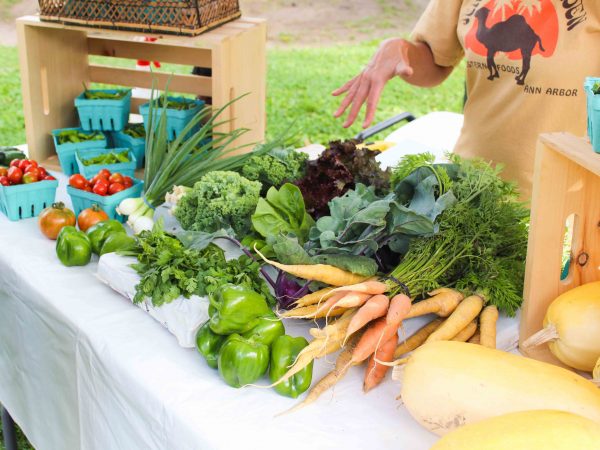
Lilly Kujawski | Washtenaw Voice
By Lilly Kujawski
Editor
If you’re mourning the end of summer, you’re not alone. September signals the return to classes and a goodbye to warm days, but it also means harvest season for many Michigan vegetables.
Apples, onions, pumpkins and squash are just a few examples of crops grown by Michigan farmers with high yields in the fall.
Eating local, in-season food is healthier and better for the environment, according to Emily Thompson, environmental science teacher at WCC and adviser for the Students for Sustainability club on campus.
“Whatever’s freshest is healthiest,” said Thompson.
It’s not sustainable for food to travel across the country to Michigan, from states such as California, because of all the fossil fuels used to ship it that far, Thompson said.
“We have perfectly good farmland around here,” she said. “A solution would be for each locality to be growing as much food as they can locally.”
Eating local foods is also important because it supports local farmers.
“When you buy local, you’re keeping more people locally employed,” said Kim Pendygraft, owner of Miss Kim’s Jams.
For some farmers, their main source of income comes from selling produce, said Sissi Rodriguez, who works at a local farm.
Making the choice to eat local produce doesn’t have to be a radical lifestyle change, according to Gary Yurick, an employee at the Ypsilanti Food Co-Op, which sells many local products.
Start with small steps, Yurick advised.
On a student budget, it might seem difficult to incorporate more local foods into your diet.
“Certainly farmers markets are a good place to get good food, but it is not necessarily the cheapest food,” said Anita Sandretto, who volunteers at the Dixboro Farmers Market in Ann Arbor. “Some of the grocery stores are now selling more local food, but you do have to look for it; and that may mean that you spend more time, and you have to decide: is your time worth it?”
“Every dollar you spend needs to get you the highest nutrition possible when you don’t have a lot of dollars,” said Kelly Voelker, a nutrition educator for the Livingston Educational Service Agency.
Produce tends to be more affordable when it’s in season, according to Dayna Popkey, the farmers market and nutrition manager for Growing Hope, a nonprofit garden development organization in Ypsilanti.
Buying produce in bulk is another way to save money, because the cost per item usually goes down when bought in large quantities, Thompson said.
However, more money is needed up-front when buying in bulk. Thompson suggested teaming up with other families or peers and going in on the cost of buying in bulk together and sharing the produce.
“Buying in bulk and freezing or canning or other methods of preserving is a really great way to have that summer produce year-long,” Popkey said.
On the other hand, when shopping at a farmers market, buying a single quantity of an item you don’t need a lot of can be an inexpensive option, too, said Tom Ellis who works at Diana’s Heirloom Produce, a local farm.
Low-income students should also check to see if they qualify for programs like Double Up Food Bucks, which doubles the value of the Supplemental Nutrition Assistance Program, or SNAP. If you’re eligible, Double Up Food Bucks allows you to receive $1 to use for fruits and vegetables for every $1 you spend on fruits and vegetables (up to $20 a day).
Double Up Food Bucks can be used at various Washtenaw County farmers markets and grocery stores, such as the Ann Arbor Farmers Market, the Ypsilanti Farmers Market, the Dixboro Farmers Market, Argus Farm Stop, the Ypsilanti Food Co-op and more.
The WCC Students For Sustainability club is currently planting a food forest on campus. Food forests are a form of gardening that mimics natural ecosystems.
The club’s goals for the food forest are to produce local food, fill a need for students facing food insecurity and to fight climate change, Thompson said.
Michigan produce in season for September
- Apples
- Grapes
- Pears
- Melons
- Raspberries
- Green beans
- Beets
- Broccoli
- Cabbage
- Carrots
- Cauliflower
- Celery
- Turnip greens
- Mustard greens
- Collard greens
- Kale
- Eggplant
- White onion
- Parsnips
- Peppers
- Potatoes
- Radish
- Spinach
- Tomatoes
- Turnips
From Michigan State Extension

